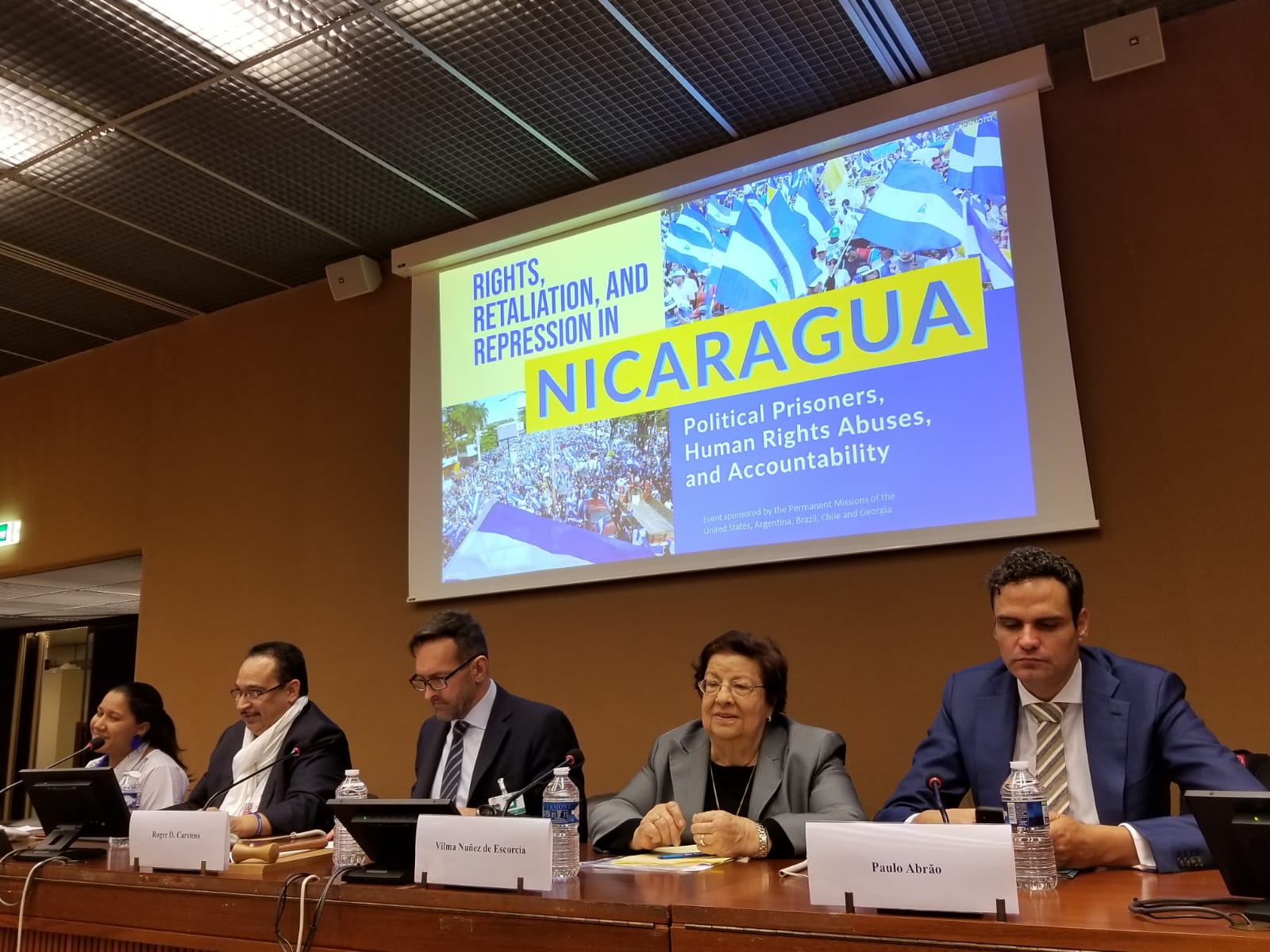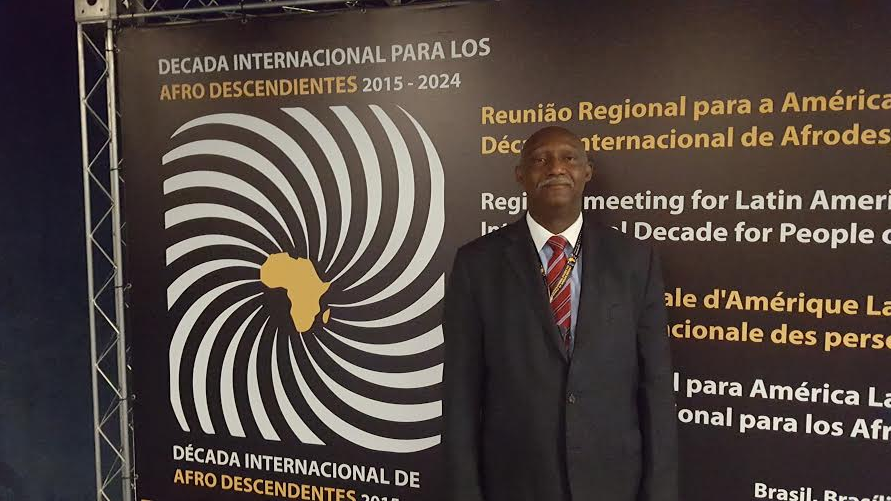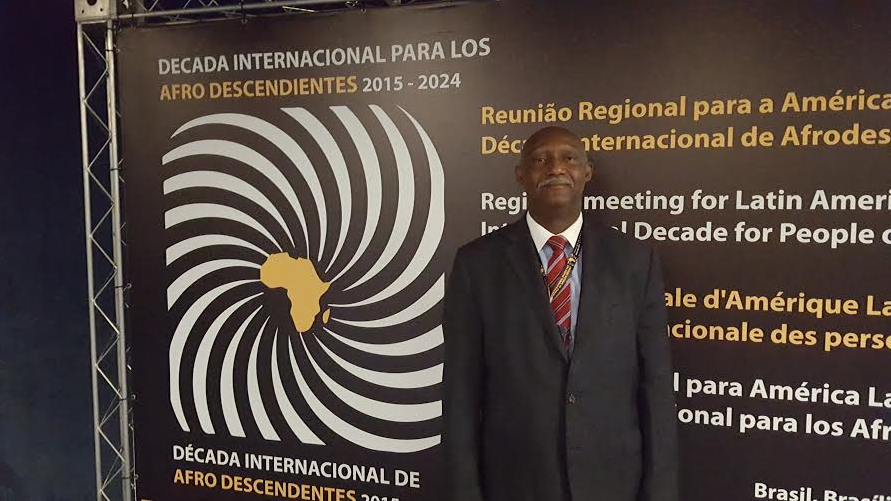Remarks in Geneva: Need for International Guarantors to Ensure Respect for Human Rights in Nicaragua
Two Nicaraguan human rights defenders, a journalist, and the relative of a political prisoner discussed on April 4th in Geneva, the current state of the deterioration of human rights in […]

Two Nicaraguan human rights defenders, a journalist, and the relative of a political prisoner discussed on April 4th in Geneva, the current state of the deterioration of human rights in their country and asked for more pressure to be exerted on the Nicaraguan government to permit international guarantors to guarantee the agreements that emerge from the negotiations between the government and civil society.
More than 40 diplomatic missions interested in knowing first-hand about the status of the crisis that began in April 2018 gathered at the event – “Rights, Reprisals, and Repression in Nicaragua” – hosted by the missions of the United States, Argentina, Brazil, Chile, and Georgia in the Palace of Nations at the UN.
As a result of violent State repression, 325 people have died and more than 2,000 have been injured, according to the Inter-American Commission on Human Rights (IACHR). To date, at least 647 people continue imprisoned for having participated in civic protests. In addition, media outlets have been shuttered, organizations declared illegal, and more than 50,000 people have had to flee the country to avoid becoming victims of the violence.

The event was moderated by Roger Carstens, Deputy Assistant Secretary of State from the Bureau of Democracy, Human Rights, and Labor; speakers included Paulo Abrão, Executive Secretary of the IACHR; Vilma Núñez, President of the Nicaraguan Center for Human Rights (CENIDH, for its initials in Spanish); Aníbal Toruño, Director of Radio Darío; and Winny Sobalvarro of the Committee in Favor of the Release of Political Prisoners in Nicaragua.
Carstens maintained that it is essential that “all prisoners who were detained for peacefully participating in opposition protests must be released; we want accountability for any crime committed against those prisoners and against all Nicaraguans during the last year,” and he went on to note that “the respect for human rights must be reinstated” in Nicaragua.
Abrão declared that without the presence of international guarantors, the relatives of the victims will not have any assurances that there will be compliance with the agreements assumed by the government: “They will have no assurance that exiles will be able to return to their country without fear and without reprisals, that the process of freeing political prisoners will follow correct protocols, that human rights organizations that were shuttered in the country will have their legal status reinstituted, and that freedom of the press will be restored along with the return of the assets of independent media and radio and television stations that were closed.”
Nor, according to Abrão, will it be possible to guarantee that “the electoral system will be able to produce new elections in the future that can be considered legitimate and that the country’s justice system will be in a position to fulfill and respond to the victims’ demand for the correct sanctions on those responsible for these grave human rights violations.”
Vilma Núñez, for her part, maintained that it has been vital for the human rights defenders and the citizenry in general to have the support of the international community, both in terms of the work of the international human rights protection mechanisms, as well as various countries’ commitment to democracy and human rights.
The Permanent Representative of Argentina to the UN Human Rights Council, Carlos Foradori, recalled that last March the delegations of Brazil, Canada, Costa Rica, Chile, Colombia, Ecuador, Peru, Paraguay, and Argentina presented Resolution L8, “Protection and Promotion of Human Rights in Nicaragua,” which was approved by the Council; its objectives are to include the state of human rights in that country on the international agenda and encourage the High Commissioner for Human Rights, Michelle Bachelet, to periodically present information on Nicaragua to the Council.

“Our countries continue to monitor the sponsors so as to ensure a dialogue process in Nicaragua. We believe that an inclusive and meaningful dialogue is the best way to make progress in guaranteeing a peaceful solution to the situation,” added Foradori.

